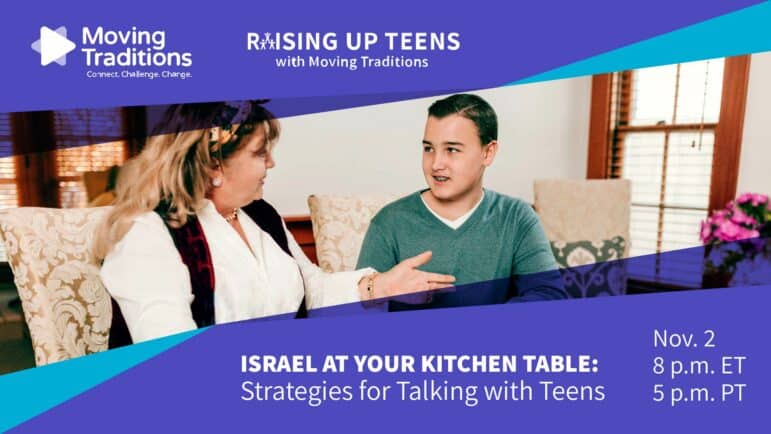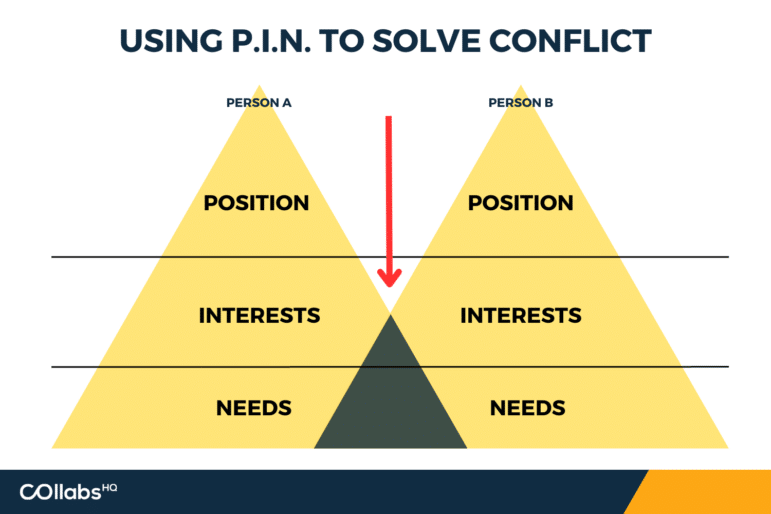On November 2, Moving Traditions hosted a webinar, Israel at Your Kitchen Table: Strategies for Talking with Teens, about how parents and teens can keep talking even as we may find ourselves with very different sources of information, peer groups, and possible responses to the ongoing war in Israel.
Our CEO Shuli Karkowsky sat down with a panel of experts to talk about the psychology behind how teens process the news, strategies to foster discussion when you agree and when you don’t, and how to set boundaries for discourse and root those boundaries in love.
Thank you to our featured speakers:
- Dr. Julie Hirschfeld, a psychologist and parent coach
- Dr. Jonathan Golden, Director of Drew University’s Center on Religion, Culture & Conflict
- Rabbi Daniel Brenner, Moving Traditions’ VP of Education
- Emily Levine, a Kol Koleinu Teen Feminist Fellow

Watch the Recording
Related Resources
Israel at War, Caring for Ourselves and One Another
To help our teens to process recent events in Israel, Moving Traditions has released a special edition curriculum for educators, which parents and others with teens in their lives may find useful. This guide provides resources for teens to:
- Feel connected to and supported by other Jewish teens at this time.
- Reflect on how they can take care of themselves as they consume the news.
- Have the opportunity to share their thoughts and feelings in response to the massacres, kidnappings, and war in Israel.
Poems for Reflecting on the Israeli-Palestinian Conflict
As you support the teens in your life, choose one or more of the following poems to read or listen to together and discuss. As you will see these poems are intended to make space for emotions and empathy, not to spur a political discussion.
Then, consider inviting participants to write a poem or prayer in response to one of the poems. They might start their poem with the opening line of the poem they are responding to (e.g. Once in a village that is burning…. ). Alternatively, you might open a Google Jamboard and invite each participant to write the most powerful line from the poem(s) that you read on a sticky. Then, create a collaborative poem from the post-its.
From Dr. Jonathan Golden: Using P.I.N. to Solve Conflict
Dr. Golden referenced a conflict resolution method that begins with identifying overlapping needs and overlapping interests before arriving at political positions. This graphic is from CollabsHQ and displays the area of conflict resolution in the smaller dark triangle.

A Blessing for Peace – Hashkivenu
הַשְׁכִּיבֵֽנוּ, יְיָ אֱלֹהֵֽנוּ, לְשָׁלוֹם, וְהַעֲמִידֵנוּ שׁוֹמְרֵֽנוּ לְחַיִּים, וּפְרֹשׂ עָלֵֽנוּ סֻכַּת שְׁלוֹמֶֽךָ, וְתַקְּנֵֽנוּ בְּעֵצָה טוֹבָה מִלְּפָנֶֽךָ, וְהוֹשִׁיעֵֽנוּ לְמַֽעַן שְׁמֶךָ. וְהָגֵן בַּעֲדֵֽנוּ, וְהָסֵר מֵעָלֵֽינוּ אוֹיֵב, דֶּֽבֶר, וְחֶֽרֶב, וְרָעָב, וְיָגוֹן, וְהָרְחֵק מִמֶּֽנּוּ עָוֹן וָפֶֽשַׁע. וּבְצֵל כְּנָפֶֽיךָ תַּסְתִּירֵֽנוּ, כִּי אֵל שׁוֹמְרֵֽנוּ וּמַצִּילֵֽנוּ אָֽתָּה, כִּי אֵל חַנּוּן וְרַחוּם אָֽתָּה. וּשְׁמֹר צֵאתֵֽנוּ וּבוֹאֵֽנוּ לְחַיִּים וּלְשָׁלֹם מֵעַתָּה וְעַד עוֹלָם. בָּרוּךְ אַתָּה יְיָ, שׁוֹמֵר עַמּוֹ יִשְׂרָאֵל לָעַד.
Our lying down for the night, Holy One, may it be in the direction of peace, and when we rise, guard over our lives. Spread over us a peace like a canopy. Address our brokenness with good counsel. Save us so that we can amplify your name.
Defend us against enemies, illness, war, famine and sorrow.
May thoughts of reward and punishment be far from us.
In the shadow of your wings because you protect us and you rescue us. For You, Holy One, are gracious and merciful. Guard our going and coming, to life and to peace evermore. Blessed are you who eternally watches over the people Israel.

